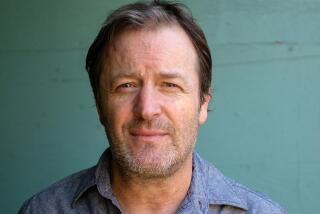For Cowboy Buddha, It’s Now and ‘Zen’
- Share via
Here’s a nice case of if-at-first-you-don’t-succeed-try-harder. Cowboy Buddha wants to play left-field twang (my proposal of a name for the country-influenced- music-with-an- artistic-conscience movement now unsatisfactorily designated “Americana,” “No Depression” or “progressive country”) and keep artistic company with the Wilcos and Son Volts of the world.
The band from El Toro did it quite badly on an unfocused, poorly recorded 1995 debut CD. Reshuffled to a more cohesive trio lineup fronted by lone holdover Fletcher Harrington, Cowboy Buddha returned last spring with a cassette EP, “Bone Crushin’ Cowboy Love,” that missed the mark.
But “Truckstop Zen” is on target. Harrington used to strain for a stately authority that was beyond him. Now his thin, reedy voice sounds natural, which is important for a left-field twanger, and musters some personality and bite without forcing it.
Like Wilco, the best rock band playing left-field twang, Cowboy Buddha steals unabashedly for its raw materials. “Trains, Small Towns and Broken Hearts” sounds like R.E.M.’s “Don’t Go Back to Rockville,” with a Southwestern twang added to the Southeastern jangle. “Ron Jeremy,” the offhanded basher that ends this six-song cassette, echoes “It’s the End of the World as We Know It (And I Feel Fine).” It’s the second recent O.C. rock song to honor the world’s ugliest porn star, following the defunct punk-pop band Brown Lobster Tank. Neil Young’s “Cowgirl in the Sand” provides the foundation for “Texas Panhandle Road Blues Drinking Song.”
*
Cowboy Buddha deals knowingly and intelligently with its source material. “Don’t Meet Me Behind the Gym,” with its Velvet Underground-style jangly bounce and thrust, segues to a fine cover of the Velvets’ ballad “I’ll Be Your Mirror.” The Manhattan drowse of the original is transposed to a tremulous plaint on the High Plains, with Harrington taking some nice, emotionally intensifying liberties with the melody (hey, all Lou Reed melodies are approximate, anyway).
The pairing lets Cowboy Buddha get away, maybe, with the nasty puttin’-down-a-woman moves of “Gym,” whose refrain doesn’t merely center on the misogynistic epithet that currently has the Prodigy in hot water, but also spells it out letter by letter. Segueing into “Mirror,” among the most tender pledges of emotional support in all of rock, is thematic spin control that lets the Cowboy Buddha men offer themselves as clear-eyed painters of the human condition in all its manifestations, rather than, say, crude Neanderthals.
With “Christmas at the Rebel Tavern,” Cowboy Buddha succeeds by taking an intimate, acoustic approach to the sort of elegiac, western-myth-laden material that sounded forced in the past. “My life’s a shrinking candle, here’s where I like to burn,” Harrington has his sad-barfly protagonist lament, in a nice turn of phrase. After striking a couple of dud matches, his band’s candle appears to be lit.
Available from Lopie Music Co., P.O. Box 1395, Costa Mesa, CA 92628; e-mail: Rootless@aol.com; Web site: https://www.cowboybuddha.com.
Ratings range from * (poor) to **** (excellent), with three stars denoting a solid recommendation.
More to Read
The biggest entertainment stories
Get our big stories about Hollywood, film, television, music, arts, culture and more right in your inbox as soon as they publish.
You may occasionally receive promotional content from the Los Angeles Times.











